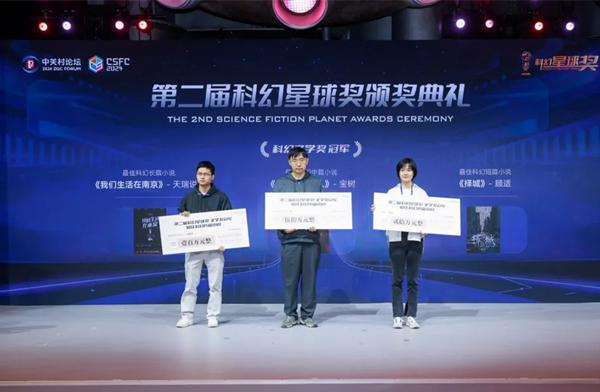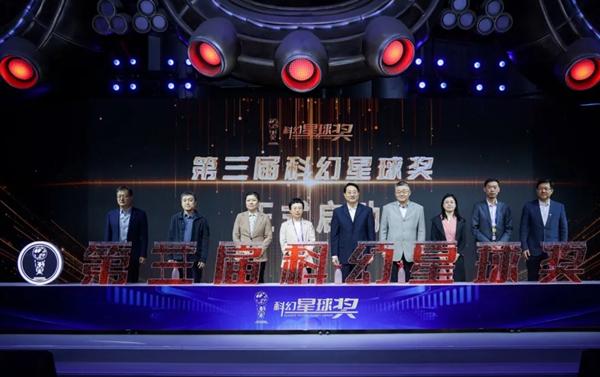Chinese writer Tianrui Shuofu's novel "Once Upon a Time in Nanjing," Frant Gwo's sci-fi blockbuster "The Wandering Earth II," and the works of numerous other sci-fi creators, along with individuals and

Winners in the literature category of the second Science Fiction Planet Awards, receive their prizes on stage at the awards ceremony held in Beijing, April 28, 2024. [Photo courtesy of the CSFC Organizing Committee]
Initiated by sci-fi luminaries Wang Jinkang, Liu Cixin, Wu Yan, and Frant Gwo, the Science Fiction Planet Awards is a key part of the China Science Fiction Convention (CSFC). The awards feature four categories: technology, literature, work, and contribution. As China's first independent international sci-fi award, it holds annual selections and offers a prize pool of 6.65 million yuan ($917,700).
Tianrui Shuofu, whose real name is He Jian, won the best novel award in the literature category for "Once Upon a Time in Nanjing." This novel, which also won the top award at the Chinese Nebula Awards in 2023, is set to be adapted into a sci-fi film titled "Echoes of Encounter" by director Lu Yang. Renowned writer Bao Shu's "Our Martians" won the award for best sci-fi novella, while Gu Shi's "City of Choice" won best sci-fi short story.
In the work category, Frant Gwo's sci-fi blockbuster "The Wandering Earth II," based on Liu Cixin's novella and grossing more than 4 billion yuan in the Chinese film market, won best sci-fi film. Tencent Video's sci-fi series "Three-Body," adapted from Liu's globally renowned epic, won best sci-fi series. Bilibili's "The Future Handbook," a collection of seven sci-fi stories by seven young directors, won best sci-fi inspirational works.
In the technology category, Timeaxis Digital Studios' LED virtual shooting technology won the best sci-fi creation award, while Beyond Real's FreeAI Builder and Sky Limit Entertainment's Shougang Park Blast Furnace No. 1 SoReal Science Fiction Paradise won the best sci-fi experience and best sci-fi creative product awards, respectively.
The contribution award was given to Tachihara Tōya, a Japanese novelist and translator who has long been dedicated to promoting Chinese science fiction literature and facilitating Sino-Japanese science fiction cultural exchanges. She has translated and published over 20 works in Japan by Chinese sci-fi authors such as Han Song, Wang Jinkang, and Wu Yan.
Wang Jinkang, renowned sci-fi giant and honorary chairman of the Science Fiction Planet Awards committee, expressed his enthusiasm for the future of Chinese sci-fi literature, highlighting its bright prospects and immense potential. He noted that the selection process was challenging, not because it was hard to find the best works, but because it was difficult to eliminate other equally outstanding pieces.
Since its launch in June 2023, the second Science Fiction Planet Awards has attracted widespread attention and participation, receiving 458 valid submissions from countries and regions including Japan, Italy, the United States, Canada, and Germany, as well as from 28 provinces, municipalities, and the Hong Kong, Macao, and Taiwan regions within China.
Under the guidance of honorary chairmen Wang Jinkang and Liu Cixin, along with jury chairpersons Wu Yan, Sun Lijun, Cui Shuguang, and Wang Lijun, among other distinguished experts in related industries, 10 "best" awards and 27 "excellent" awards were selected. Among the recipients of the excellent awards were Fujisaki Singo's novel "Abyssal Wars," James Cameron's film "Avatar: The Way of Water," and Denis Villeneuve's "Dune."

The third Science Fiction Planet Awards is also launched at the awards ceremony held in Beijing, April 28, 2024. [Photo courtesy of the CSFC Organizing Committee]
James Nobles, president of the SMEs & Entrepreneurs Committee of the American Chamber of Commerce in China, also attended the ceremony and delivered a keynote address. He emphasized the committee's focus on the technology category, which not only represents the latest technological trends but also guides the future development of small- and medium-sized enterprises.
"Whether artificial intelligence, bioengineering, or sustainable energy, the recipients of these technology awards have shown how to integrate science fiction into reality and address real-world issues through technology," he said. "We believe that by strengthening cooperation between China and the United States and globally, our collective future will be brighter. Science fiction is not just about the vast expanse of the cosmos; it is a force for enlightened thinking and leads to action."




